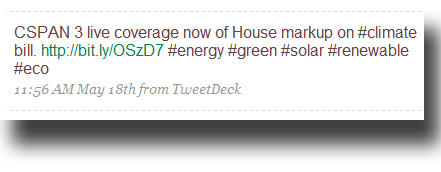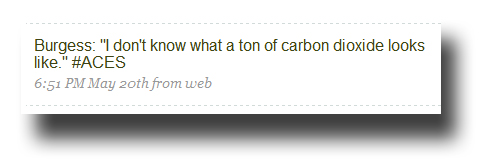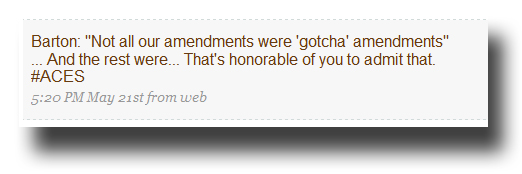After months of planning, long days of contentious hearings and a final four day marathon push, the nation’s first bill to address global warming comprehensively passed out of the House Energy & Commerce Committee last Thursday night on a nearly party-line vote of 33-25.

Bono Mack at the Salton Sea
As expected, a few conservative Democrats voted against HR 2454, “The American Clean Energy and Security Act”: Mike Ross (AR), Jim Matheson (UT), Charlie Melancon (LA), and John Barrow (GA) — all representing states that voted for John McCain last November.
Somewhat more of a surprise was Congresswoman Mary Bono Mack’s “Aye” on the bill — the sole Republican vote for HR 2454. But not everyone was surprised.
“Her vote was one that we were hoping to get,” Tiernan Sittenfeld, legislative director of the League of Conservation Voters (LCV) told the Sun. Sittenfeld pointed to other environmental issues that Bono Mack has supported, particularly relating to land use.
“We are delighted to get her vote,” said Sittenfeld, “but we always hope to get it. And over the years she’s had a growing interest in energy issues.” Earlier this year, for example, Bono Mack became a co-sponsor of a bill that supports solar power, introduced by Democrat Michael Thompson (CA).
Palm Desert, CA, city councilman Jim Ferguson praised Bono Mack “for her assistance in encouraging distributed green energy generation which will empower residents with an affordable alternative to traditional energy suppliers.”
A few days before the markup, she told a reporter that she was “a potential ‘yes’ and a potential ‘no.'”
Her interest in energy conservation was evident during California’s energy crisis in 2001, when Bono Mack publicly called on then-President Bush to direct Western federal facilities to cut energy consumption by 20%.
Republicans for Environmental Protection (REP) has given Congresswoman Bono Mack fairly low, but steadily climbing, numbers on the group’s annual voting scorecard. For the 109th Congress (2005-2006) Bono Mack voted with the environmental group’s positions just 27% of the time. In REP’s most recent scorecard, the 110th Congress (2007-2008), Bono Mack had moved up to 42%.
Bear in mind, however, that those rankings come from a Republican organization. It’s a group I know fairly well, having attended one of their annual meetings, and from interviewing the group’s leaders many times over the years. I respect their sincerity and admire their dedication to the Sisyphean task of turning the GOP green. That said, REP is an openly partisan organization and I think their scorecard reflects that fact.
Bono Mack doesn’t do as well on the voting scorecards of the non-partisan League of Conservation Voters.

Yet, the trend is the same here as in the REP scorecards. Bono Mack’s voting record gets greener every Congress, going from a 7% LCV rating in the 1999-2000 session to a respectable 30% rating in the last session.
Asked about Bono Mack’s numbers, LCV legislative director Sittenfeld laughed and said the only thing she could under the circumstances: “In our view, that’s a very good trend.”
Actually, it’s even better than “good” when you consider that the GOP’s voting scores as a group have been trending in the opposite direction over this same time period.
There’s a case to be made that Bono Mack is simply doing what successful politicians do — tracking her constituents changing views and adopting positions that will return her to Congress ever two years. As evidence, supporters of this theory point out that the 45th District voted for Barack Obama last November, the first Democrat to carry the district in decades. Bono Mack herself barely survived — winning the closest election of her political career. Her opponent in 2010 will likely be the Democratic mayor of Palm Springs, Steve Pougnet, who is already making the environment, and renewable clean energy in particular, the centerpiece of his campaign. It’s hard to see how Bono Mack could have voted against this bill — even if she had wanted to — and still have a shot at reelection.
But, did she want to vote against the bill? No one really knows. Bono Mack herself says she didn’t know how she would vote until the 11th hour. A few days before the markup, she told a reporter that she was “a potential ‘yes’ and a potential ‘no.'” In fairness to Bono Mack, there were forces galore pushing her, hard, in either direction.

Mary Bono Mack voting "Aye"
In the end, of course, what really matters is that when the clerk called her name last Thursday night, Congressman Mary Bono Mack responded “Aye.”
And if she’s persuaded by constituents to embrace renewable, clean energy, well, isn’t that an important part of what Democracy is about? At some point, however, Bono Mack will need to break out of her moderate “follower” mode when it comes to the environment or the voters in District 45 may decide to go with someone who comes out for the environment, earlier and swinging hard.
After her vote last week, Bono Mack may be ready to become the strong environmental advocate her fans in REP seem to believe is just below the surface.
—————————
![]()

Press Release, May 21, 2009
Congresswoman Mary Bono Mack
“This climate change legislation is one of the most sweeping, complex bills that Congress has considered in recent years, and while far from perfect, it sets us on an important path toward building a greener, more sustainable economy.
“While I still have significant concerns about this bill, particularly with regard to its cost and its failure to recognize innovative technologies like advanced nuclear energy, I believe this is the right direction for our District, for our nation and for our future. Already, in our region, we are seeing exciting new developments in wind, solar and geothermal energy, and this bill will help us grasp this potential.
“As we look at the global environmental situation, in addition to the need to reduce our heavy reliance on foreign oil, it is clear that we must provide certainty to those who want to invest in research and development of new green technologies. We cannot afford to wait to make needed changes to our energy policy that will reduce greenhouse gas emissions, reduce our dependence on foreign oil and expand our nation’s clean energy portfolio.”








